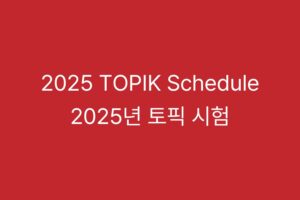

Hello, Korean learners! Today, we’re going to dive into the TOPIK listening test, particularly focusing on why many learners find this section challenging. Listening is a crucial part of language learning, and it holds significant weight in the TOPIK exam. We’ll explore why achieving high scores in the listening part can be tough and how you can improve your performance.
Before we delve deeper, I’d like to briefly introduce a previous post on our blog titled ‘Introduction to TOPIK Listening Test Problems’. This post thoroughly discusses the structure of the listening test, its evaluation method, and common types of questions. Reading it will provide you with a solid background understanding for today’s topic and help you approach the listening test preparation more effectively. [Click here to read the post]
In this article, we will discuss the challenges of the TOPIK listening test and provide specific strategies to overcome these challenges. Let’s get started on enhancing your TOPIK listening skills!

The TOPIK listening test is a vital indicator of your proficiency in the Korean language. Many learners struggle with Listening in dailyl life due to the diversity of language and the speed of conversation. The varying accents and expressions across different Korean regions can be particularly confusing for beginners, and keeping up with the rapid pace of natural dialogues poses another challenge. However, the TOPIK listening test comes out at a very slow pace. Additionally, standard intonation and expressions are used.



Today, we have explored the significance of the TOPIK listening test, the common challenges learners face, and the effective strategies to overcome these challenges. To succeed in the listening test, it’s crucial to expand your vocabulary and grammar knowledge, understand the context of conversations, and learn advanced vocabulary specific to various topics. These skills develop gradually through time and effort.
Consistency is key. It’s essential to practice Korean listening skills daily, utilizing various materials like news, dramas, and podcasts. This exposure to different linguistic environments is beneficial. Also, reflecting on your learning process through a listening diary, noting down your experiences and challenging aspects, is crucial for continuous improvement.
Remember, the difficulties you encounter in language learning are part of the journey. We hope the strategies shared today will help you enhance your TOPIK listening scores. We’re rooting for your successful Korean language learning journey!
If you found this article helpful, please share your thoughts in the comments. For more tips and resources on Korean language learning, subscribe to our blog and share this article with your friends. Improve your TOPIK listening skills and get 100 points on the test!






주식회사 챕터코리안, 대표 김대광 | 사업자등록번호 : 471-88-02872 | 통신판매업신고번호 : 제2024-서울중구-1387호| 서울 퇴계로 36길 2 812호
대표번호 : +82-10-2981-4359 | 이메일 : [email protected]
이용약관 | 개인정보처리방침 | Cookie Settings
Copyright 2023 © ChapterSeoul